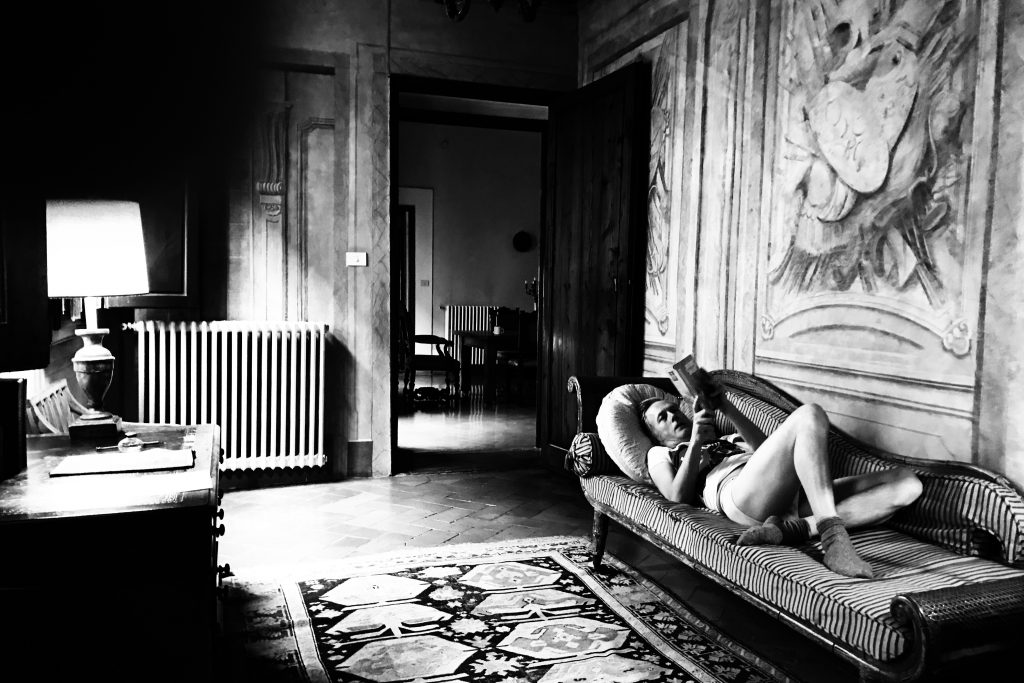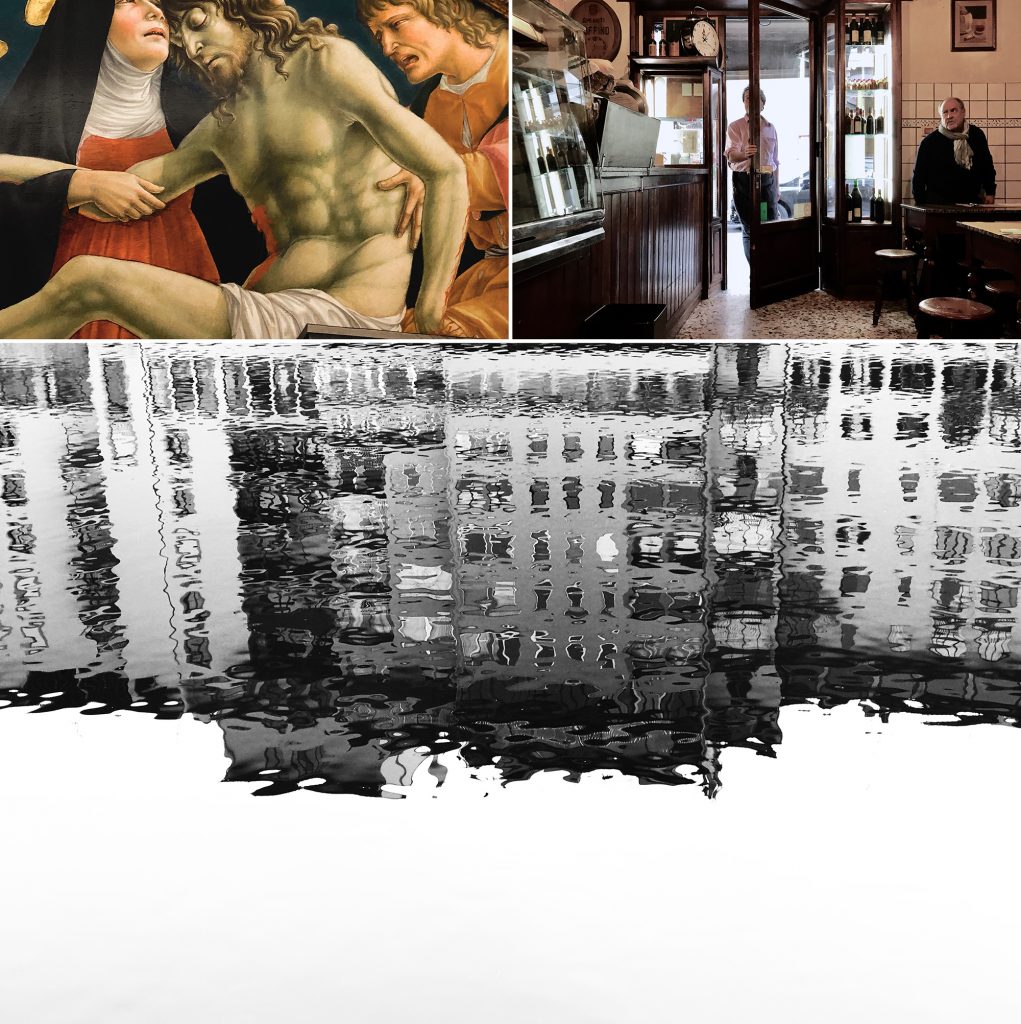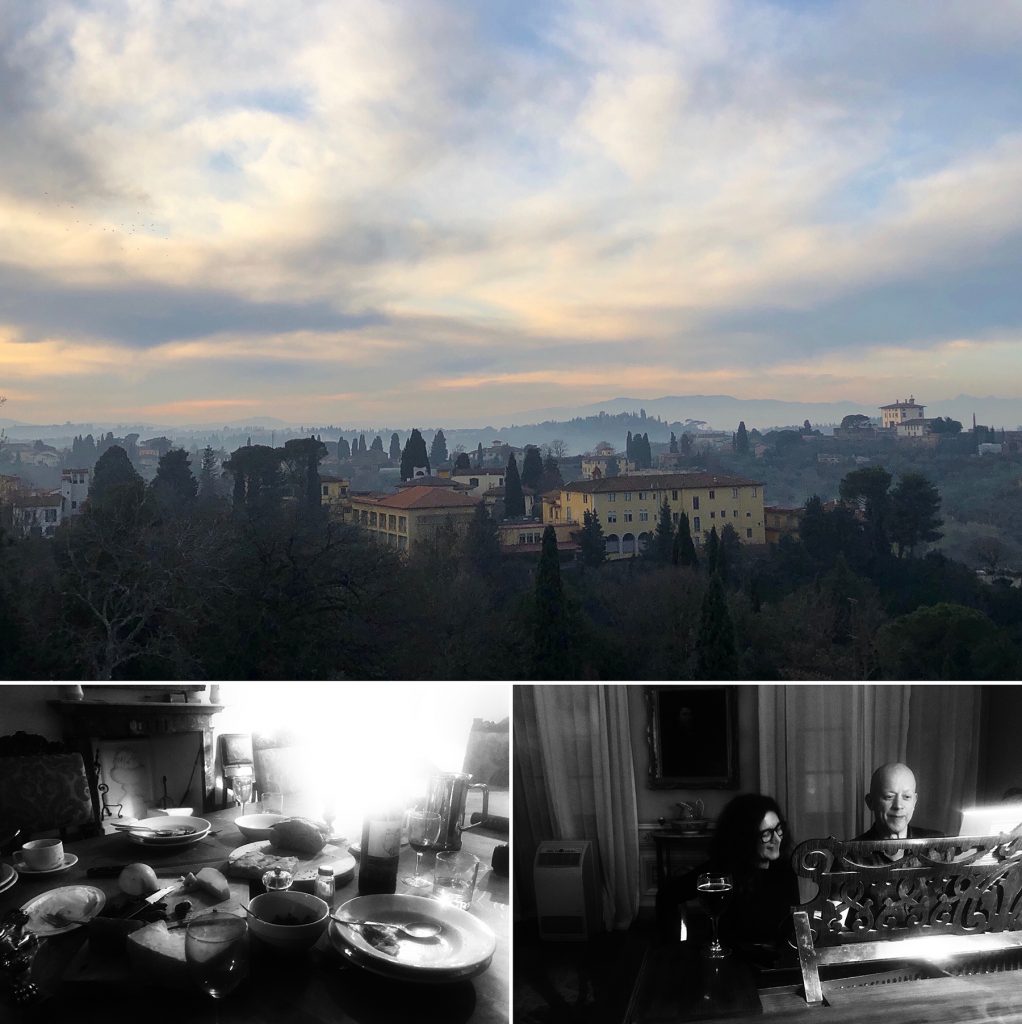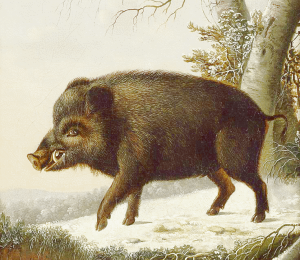Cinghiale in Agrodolce. The Arno To The East Branch
It begins on the fifth floor of a pre-war building overlooking the Arno with a view of San Miniato and the crooked paths of Giardino Bardini; home of Elisabetta, an actress in her unplaceable 60’s. The rambling apartment reclines with the easy grace of a woman who cut her style-chops in the twilight years of Pasolini and Visconti: family photographs of naked children the colour of hazelnuts dandled by shirtless men who look like Marcello Mastroianni on boats off Stromboli: 70’s record player, Bill Evans albums, dubious abstract nudes hung crookedly. And the classic cookbook Il Talismano della Felicità, its pages tanned to parchment, open on the counter to some indecipherable flurry of pictureless Italian: the best textbook you never saw.
In the republic of taste, property is theft; and this was one of those crystalline amalgams of beauty, gravity and poise that can drive a man to burglary. But you can’t just run off with somebody’s book. That’d be rude. Also, it’s fucking heavy. So plan b: a quick sortie around the internet, there’s a late-50’s edition languishing a few hundred feet away in a Santa Croce antiquarian bookshop. Bit of deft mousework and the deed was done: we’d plucked a magic bean from Elisabetta’s stalk to take home and bury in Kingston’s flinty soil. With love and water it will germinate into La Dolce Vita on the Little Delaware.

Once home, Il Talismano succumbed to the fate of stuff that seems an imperative when amber light is refracting off the Arno, but blurs to inconsequence when somebody’s locked the cat in the bedroom and your Tempur-Pedic smells like the Humane Society. It took a week for our own Scottish-Italian Ingrid Bergman – Paola Ambrosi de Magistris – to absent-mindedly leaf through the book and find a letter tucked deep in its pages. On Air Mail paper, yellowed with age, hand-typed on official Foreign Service letterhead from the U.S. Embassy in Rome, it’s a rendering of a recipe – Cinghiale in Agrodolce alla Romana – translated into English with personal annotations from the correspondent. Bacon for smoked ham, celery seed for celery.
Sweet and sour wild boar, Roman style. The writer – Mary Jernegan – signs off with a footnote: ‘this is a classic Italian recipe, from people who love to hunt and eat well … wish I were there to help cook and eat it!’. Clearly the book was a gift, Mary the giver. Written in 1957, the letter suggests a diplomatic blend of official and personal: wife to wife, maybe? Other than spearing the occasional mushroom with Evan the Forager, we don’t hunt. But plenty of folk round here do. And we do eat well. And whilst we don’t have wild boars snouting our forests (at least not of that spelling), we have plenty of local, barely domesticated pork. So why not celebrate the sudden appearance of this wormhole to another dimension by fulfilling Mary Jernegan’s exhortation to cook the meal and eat it? Right here, right now, 4300 miles and how ever many years from the impulse. Ride the space-time continuum. Squeeze the universe into a ball. But the question remains; who was Mary Jernegan, our guide to all things agrodolce?

In 1955, John Durnford Jernegan, a career U.S. diplomat, was assigned the post of Minister-Counselor at the American Embassy in Rome, under Clare Boothe Luce (first ever American female ambassador and, famously, author of The Women). Jernegan’s previous service included spells in Mexico, Tunisia and Spain during the Spanish Civil War; but most notably, he served in Iran during WWII, where he was present at the 1943 Tehran Conference attended by Churchill, Roosevelt and Stalin. This meeting – the first ever between Stalin and Roosevelt – initiated a tripartite commitment to simultaneous 1944 offensives against Nazi Germany (the Normandy landings) and forged the template for Soviet domination of post-war Eastern Europe. It was here that the satellite states of Czechoslovakia, Poland, Hungary, Romania and East Germany were ceded to Russia, precipitating conditions that gave rise to the 46 year division of Europe, the Berlin Wall and the Cold War. Thus Jernegan was quietly, repeatedly, present at the meridian of world history. It was whilst serving in Iran that he met Mary Margaret Brownrigg, 11 years his junior, the future Mrs Mary Jernegan and author of our letter.
A brief glimpse into the lives of John and Mary Jernegan constitutes a peek behind the curtain of mid-century Graham Greene-style diplomacy. The balance of world power was undergoing seismic changes and these people were at the eye of the hurricane, struggling to retain good manners and politesse against a background of chaos and blood-letting. Kingdoms were vanishing, dynasties crumbling. The Middle East in particular was a shitstorm of lurid immolation: republican coups d’état in Egypt and Syria, civil war in Jordan and Lebanon, the end of the British Mandate for Palestine, formation of Israel, a CIA-backed coup in Iran. And then in 1958, a particularly grisly revolution in Iraq, involving the execution of the Royal Family and the Crown Prince’s mutilated body being dragged through the streets of Baghdad, then strung up outside the Ministry of Defence. The Prime Minister escaped dressed as a woman. This was the Theatre of Blood into which John and Mary Jernegan were inserted as first U.S. Ambassadorial family to Abd al-Karim Qasim’s fledgling Republic of Iraq. The descriptions of crafts bazaars and people giddily falling into ponds at embassy parties are in stark contrast to the harsh realities of the history enacted beyond the compound walls. The Jernegans remained in Baghdad until their expulsion in 1962, when the Kennedy Administration objected to Iraq suddenly claiming the Sheikhdom of Kuwait as its own – a gesture eerily similar to one three decades later that precipitated the first Bush-era Iraq War. Another CIA coup (involving poisoned handkerchiefs and other Kennedy-era tomfoolery) endorsed Abd al-Karim Qasim’s assassination, installing the Ba’athist regime which gave rise to the twenty-seven year reign of Saddam Hussein. Two wars, eight years of U.S. occupation and the rise of the Islamic State brings us to the present. But Mary Jernegan was right there, mixing Singapore Slings in the crucible of the past.
Mary Brownrigg Jernegan died in November 2014, in Roseville California. More than half a century of febrile history has elapsed since she sat at a typewriter in Rome and translated the recipe which now sits on our kitchen table in upstate New York. The same table that will soon be set for Cinghiale in Agrodolce alla Romana, along with friends, gelato alla nocciola and, at Mary’s request, several bottles of good red wine.

CINGHIALE IN AGRODOLCE ALLA ROMANA
Freshly ground black pepper
First, the boar must be marinated. Make the marinade from the above ingredients which have been brought to a boil, and then let cool. Take a 3 pound piece of boar meat, wipe carefully with a damp cloth, dry, place in a bowl and pour the cold marinade over it. Turn 2 or 3 times a day for 2 days. When ready to begin cooking, take the meat out of the marinade, dry it and bind it with string so it will keep its shape. Pour some oil into a heavy casserole and when it is hot, start browning the meat over a bright flame. When the surface has formed a golden crust, season with salt and pepper and add the following, all finely chopped:
Fine strips of bacon
Continue browning the boar and chopped seasoning over a bright flame, watching carefully so that they turn a rich brown but do not burn. At this point add a glass of dry red wine, scraping the savory bits off the bottom of the casserole with a wooden spoon. When the wine has evaporated, cover the meat with hot water. As soon as it begins to boil, cover the casserole, lower the flame and let it cook slowly. It will be done when a cooking needle can easily penetrate the meat.
Remove the boar from the casserole, remove the string and place in another, smaller casserole. Spoon some of the juices over it, cover and keep in a warm place. Now skim off all the fat from the leftover pan juices and set aside until needed for the sweet-sour sauce.
Candied orange and lemon peel
Place sugar in a little saucepan, add bay leaf and garlic, melt over the flame, stirring constantly. Do not add any water. When the sugar has become blonde, add the vinegar. This will make the sugar stick to the bottom of the pan, so take care to loosen it gently and keep over the flame until it has once more melted completely. Now add the grated chocolate. Let it boil for a bit and when the chocolate has melted, pour the sauce into the casserole containing the skimmed pan gravy. Mix well, bring to a simmer and if the sauce is too thin, thicken it with the flour-butter ball. When the proper consistency has been reached, strain the sauce into another saucepan, add the fruit and let simmer just long enough to marry the flavors.
Carve the boar meat, arrange it on a serving platter, pour the fragrant, pungent sauce over and serve it with a flourish.
Mary Jernegan
•••

